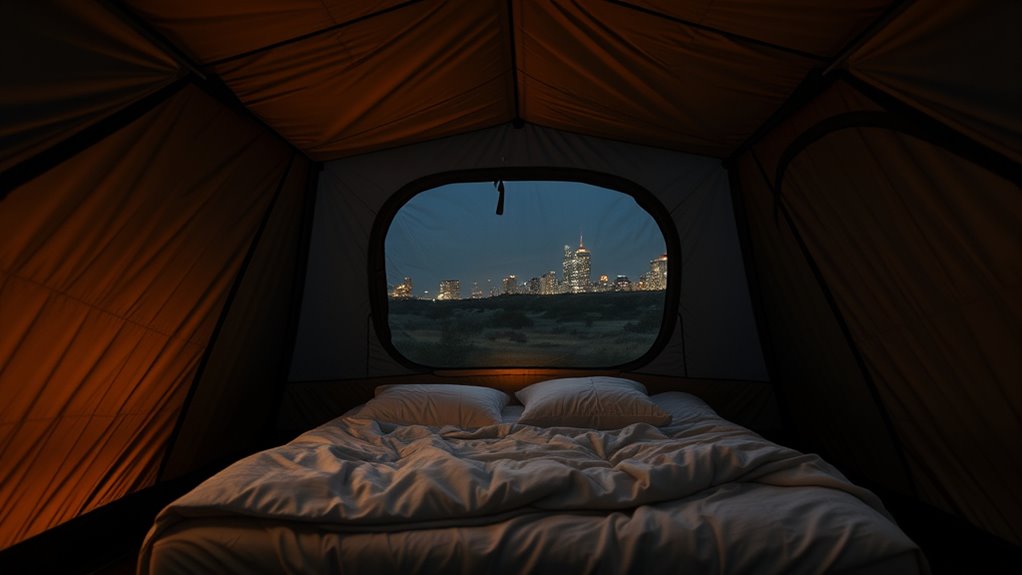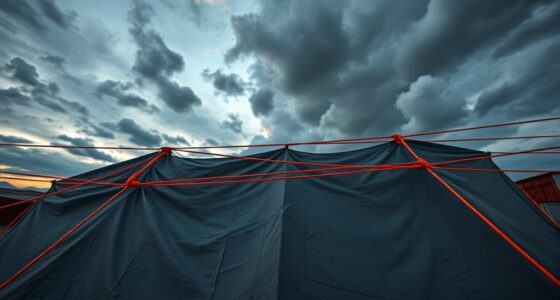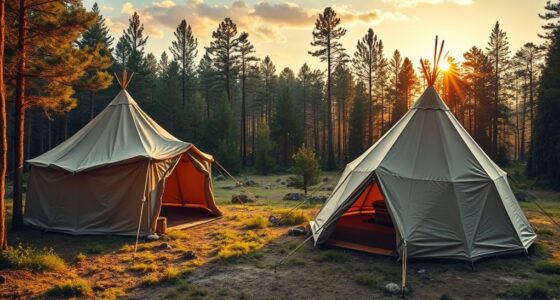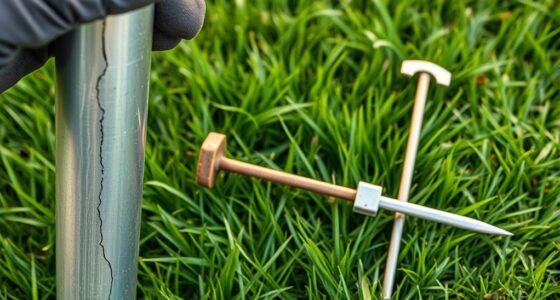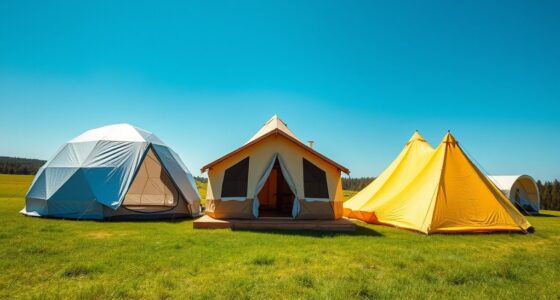To reduce nighttime noise inside your tent, choose a well-constructed shelter with thick fabrics, layered linings, and few seams for better insulation. Set up your tent away from busy areas, like roads or water, and position it among trees or on uneven ground to dampen sound waves. Adding foam panels, thick sleeping pads, and extra gear inside can further block out noise. Keep exploring to discover more ways to create a peaceful, restful camping environment.
Key Takeaways
- Choose tents made from layered, sound-dampening fabrics with tight seals and minimal seams to block external noise effectively.
- Add internal insulation like foam panels or reflective blankets to absorb and reduce sound transmission inside the tent.
- Position your tent in quiet areas away from roads, water sources, and among natural barriers like trees or uneven terrain.
- Use thick sleeping pads and layered gear to buffer ground and ambient noises, enhancing overall soundproofing.
- Combine strategic setup with high-quality, insulated tents for a peaceful, noise-reduced sleeping environment.
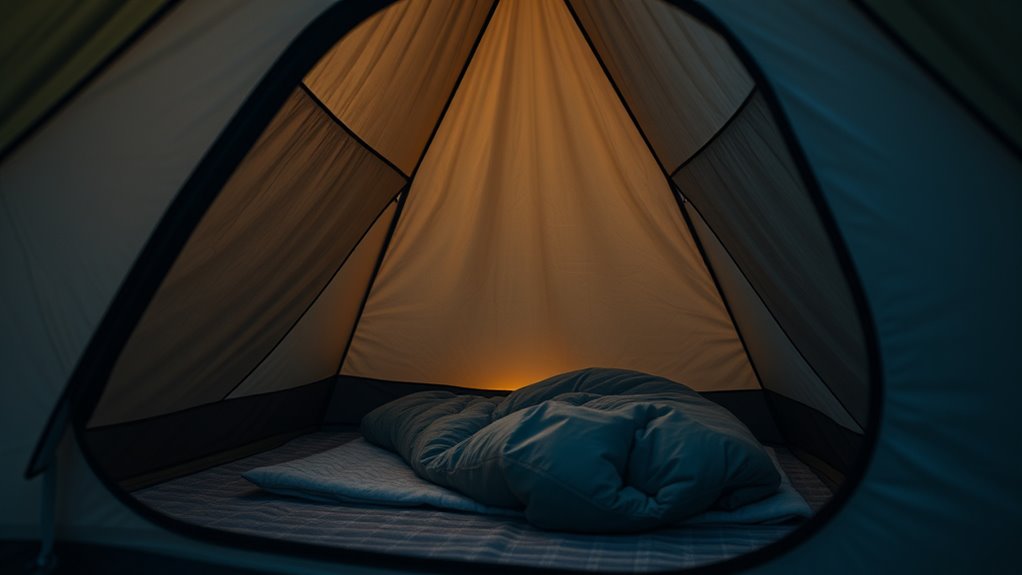
Soundproof shelters are an effective solution for reducing noise and creating a quiet space in noisy environments. When you’re camping or staying in an area with constant sounds—be it traffic, wildlife, or nearby activities—finding a way to block out the noise can make a huge difference in your comfort and sleep quality. One of the key elements in achieving this is proper tent insulation. Insulation isn’t just for cold weather; it also helps dampen sound waves, preventing noise from traveling easily through your tent’s fabric. When you select your camping gear, look for tents that feature thicker, more durable materials that can serve as natural sound barriers. Many high-quality tents are designed with layered fabrics or special inner linings that enhance insulation, which in turn reduces external noise.
Adding additional insulation to your tent can boost its soundproofing capabilities. You might consider using foam panels or reflective blankets inside the tent, but even simple approaches like using a thick sleeping pad or layering your camping gear can make a difference. For example, placing your sleeping bag on a foam pad not only keeps you warm but also buffers sound from the ground and nearby sources. If you’re serious about minimizing noise, you can even invest in specialized tent insulation kits that are designed to fit your specific model and improve soundproofing. These kits typically include sound-absorbing materials that are easy to install and remove, making your campsite more peaceful without sacrificing portability. Additionally, choosing tents with fewer seams and tighter seals can significantly reduce sound leaks.
Your choice of camping gear also impacts how well your tent insulates against noise. Opt for tents with fewer seams and tight zippers, which help seal out sound leaks. Heavy-duty rainflies and vestibules can also add layers of insulation, further muffling external sounds. When setting up your shelter, choosing a location away from busy roads or noisy water sources can enhance your quiet experience. Positioning your tent among trees or on uneven terrain can naturally dampen sound waves and provide additional insulation.
Ultimately, reducing night-time noise inside your tent involves a combination of smart gear choices and strategic setup. Invest in a tent with solid insulation, add extra layers when needed, and position your shelter thoughtfully. These steps, along with well-chosen camping gear, will help you enjoy a more restful night’s sleep, even in the noisiest environments. By paying attention to tent insulation and your gear, you turn a noisy campsite into a peaceful retreat. Making use of advanced soundproofing techniques can further enhance your quiet space and ensure a restful night.
Frequently Asked Questions
What Materials Are Best for Soundproofing Tent Shelters?
For effective soundproofing in your tent shelter, you should consider using fabric insulation, which absorbs noise and reduces echoes. Acoustic panels are also great; you can attach lightweight panels inside the tent to dampen sound further. Combining these materials creates a quieter environment, helping you rest peacefully. Make sure the fabric insulation is thick and the acoustic panels are properly installed for maximum noise reduction.
How Effective Are Soundproof Shelters Against Extreme Weather?
Think of your shelter as a fortress against nature’s fury. Soundproof shelters, designed with thick insulation and weather-resistant materials, are quite effective against extreme weather. They provide solid noise insulation, keeping you cozy and quiet. While no shelter is invincible, high-quality soundproof designs boost weather resilience, shielding you from wind, rain, and cold. You’ll stay comfortable, protected, and undisturbed, no matter how fierce the elements get outside.
Can Soundproof Shelters Be Easily Portable for Camping Trips?
You’ll find that soundproof shelters with a portable design are quite practical for camping trips. They’re built to be lightweight, making them easy to carry and set up at your campsite. While some models balance durability with minimal weight, always consider weight considerations to choose the best option for your adventure. With the right portable soundproof shelter, you can enjoy quieter nights without sacrificing convenience or mobility.
What Is the Cost Range for Installing Soundproof Tent Solutions?
The cost estimation for installing soundproof tent solutions varies based on materials and size, so you should consider your budget considerations carefully. Portable options like insulated panels or soundproof curtains can range from $50 to $300, while more advanced, permanent setups might cost $500 or more. You’ll want to balance your needs with your budget to find a solution that effectively reduces noise without overspending.
How Do Soundproof Shelters Impact Ventilation and Airflow?
Soundproof shelters can affect ventilation challenges by limiting airflow and making it harder for fresh air to circulate. You might need airflow modifications, like installing vents or exhaust fans, to maintain good ventilation. While reducing noise, these shelters may require careful design to balance soundproofing with proper airflow, ensuring you stay comfortable and safe inside without sacrificing the noise reduction benefits.
Conclusion
Creating a soundproof shelter can drastically improve your camping experience, allowing you to enjoy peaceful nights away from noise pollution. Did you know that studies show 70% of campers struggle with sleep due to external sounds? By investing in soundproofing, you’ll not only sleep better but also wake up refreshed and ready to explore. Don’t let noise ruin your adventure—build a shelter that guarantees restful nights every time.

